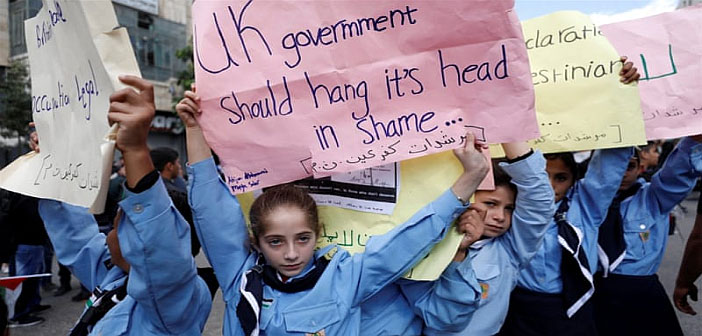Rather than celebrate the calamitous Balfour declaration in 1917, Britain should help forge an independent Palestinian state.
Source: Guardian
A century on, every Palestinian is still plagued by the consequences of that decision – whether it is the refugees yearning to return, still clutching the keys to their homes, Palestinians suffering under an occupation that has lasted 50 years, Jerusalemites experiencing the fraudulent transformation of the character, demography, culture and landscape of their city before their eyes, or Palestinian citizens of Israel who are undergoing an intricate and cruel system of discrimination and exclusion in a country that claims to be democratic.
The Balfour declaration was quintessentially a colonial decision emanating from the myth of the “white man’s burden”, the idea that “advanced nations” needed to administer the territories of “peoples not yet able to stand by themselves” – in the words of the covenant of the League of Nations – an inherently problematic and racist notion in itself.
The land was neither Balfour’s nor Britain’s to give away, but, as is always the case with colonialism, a diktat made in a capital far away is meant to supersede the collective rights and aspirations of a people.
Contrary to an oft-propagated myth, the land was not devoid of people. In 1920 the Jewish population in Mandatory Palestine stood at only 11%; their land ownership was less than 7% by 1947. Yet Balfour took it upon himself to relegate the status of the indigenous people of the land to “non-Jewish communities” – a second-class entity whose primary existence was that of “the other”, consisting of “communities” rather than a people with national rights who have been calling the land home for centuries.
While the Jewish Palestinians became the primary demographic and were offered a “national home” in Palestine, the Christian and Muslim majority were defined by what they were not, and demoted to the status of holding only civil and religious rights. Consistent with colonial form, Balfour not only failed to recognise the political, human and legal rights of the Palestinian people, he also stripped away their most sacred collective right: the right to self-determination. Balfour deemed us unworthy.
These historical injustices are not the totality of the colonial legacy still in existence today. The narrative, myths and language that have been used to justify Balfour and its corollary events – from the Nakba in 1948 to the Naksa in 1967, and the continued occupation today – are an extension of the racist, colonial spirit that defines the document. A century on, the dehumanisation and marginalisation of the Palestinian people persists, and is used as a basis to deny us our most basic rights.
A misleading veneer of “religious conflict” has been superimposed on what are essentially political, legal, moral and human rights violations. The coinage of the mantra “Judeo-Christian values” has also been conveniently utilised to exclude and demonise “the other”, whether Christian or Muslim – setting the tone for the slanderous label “radical Islamic terrorism”. Any criticism of Israel is dismissed on the basis that Israel is a beacon of “democracy” and “western values” in a region of violence and darkness. The racist claim of a “villa in the jungle” is simply the contemporary equivalent of the “white man’s burden”.
To this day, the UK has failed to recognise this legacy, admit its culpability and apologise for this historic injustice. In fact the prime minister, Theresa May, has publicly stated that Britain takes “pride” in the declaration, and Her Majesty’s government plans to celebrate its anniversary.
When will Britain recognise that the real legacy of the Balfour declaration is of suffering, dispossession, oppression and injustice – a painful legacy that every Palestinian generation since 1917 has inherited?
If the UK is looking for past glories, it will not find them in exceptionalism, stepping outside the global consensus or celebrating the colonial calamities it has created. Rather, it is called upon to stand up for what is right, and become a champion of the norms and values we collectively hold as an international community.
The first step in a process of rectification and redemption is to recognise this historical injustice and apologise to the Palestinian generations that have been its victims. The UK must decide to stand for peace, equality, justice and self-determination, and hold Israel accountable for violating these basic rights. Having denied us that opportunity in 1917, a century on we hope Britain can help create and recognise a sovereign, independent Palestinian state. A century on, we hope Britain will make it right.
• Hanan Ashrawi is a Palestinian politician. She is a member of the PLO executive committee and the Palestine legislative council as well as being head of the PLO department of culture and information
Join the demonstration on 4 November 2017 to demand justice and equal rights for Palestinians now.
 Justice Now: Make It Right For Palestine – National March & Rally
Justice Now: Make It Right For Palestine – National March & Rally
Saturday 04 Nov | Assemble Grosvenor Square. Details…

